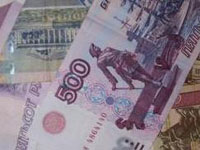Putin and Duma change legislation to boost confidence in ruble
The State Duma passed Wednesday the bill “On changes to be applicable to certain laws of the Russian Federation with regard to requirements for price identification.” The bill, which bans price identification of goods and services in foreign currency, passed the Duma in three readings. In the meantime, Russian President Vladimir Putin signed off a decree that orders government officials to refrain from referring to cost of goods and services in foreign currency in official speech. The final version of the bill has softened considerably compared with an original proposal put forth by Russia’s Public Chamber last April. The proposal called for imposing a strict ban on the use of the words “dollar” and “euro” in official speech and the media. On the other hand, the lawmakers made good use of the moment to display their patriotic sentiments.

Last April the Public Chamber unveiled its plan to ban the use of the words “dollar” and “euro” in official speech for government officials and the media. It was one of the first proposals initiated by the Public Chamber, which had been barely formed by that time. According to the proposed law, the cabinet ministers would be forbidden to identify cost in foreign currency in the media and official speech. Using terms related to foreign currency would be prohibited when describing the following: cost of goods and services; cost of transactions values and property; all-level budget indicators; government and municipal loans; foreign and municipal debt. Those infringing on the norm would be punished by a fine in the value ranging from 40 to 50 minimum monthly wages. Under a similar law, the restrictions would also apply to members of the Upper House of Russian Parliament, the Duma deputies, and civil servants. Besides, references to foreign currency in context of price identification would be forbidden in the media and web sites.
Both the press and the government cold-shouldered the proposed law. Kommersant newspaper called the idea an “idiocy.” Russian Finance Minister Alexei Kudrin described it as “absurd,” adding that he was ready and willing to pay fines for identifying budget indicators in dollars. German Gref, head of Russia’s Ministry of Economic Development and Trade, said that his ministry would have to use the word “buck” in place of the dollar references.
Despite being an overtly radical in nature, the plan gained a lot of popularity with the Duma deputies. The bill was submitted for consideration of the Duma on April 21, and adopted about a month later. It is noteworthy that the government expressed a negative opinion on the bill prior to voting. As a rule, a bill disapproved by the government does not pass the Duma. However, a vote on the bill gave the Duma deputies a rare opportunity to justify their existence and show off their patriotism under the circumstances.The deputieswere ready to take the opportunity and embrace the idea no matter how radical it might appear.
A milder version of the bill was passed by the Duma in the second and third readings later in the summer. On the one hand, the bill said that prices must be identified in rubles only. On the other hand, the bill would permit the use of hard currency price tags provided that the above also state the equivalent in rubles. However, the bill was soon mothballed after the Duma’s committee for state building and constitutional lawmaking decided to examine it yet another time on the basis of the second reading. The Duma was supposed to vote the bill into law last fall. But the bill was not passed in the fall.
The latest version of the bill and the proposal in its original form has very little in common. Basically, it aims to convey public support for the national currency without affecting routine use of terms related to foreign currency. The changes will primarily apply to domestic trade. All prices are to be identified in rubles.
Politicians and government officials are recommended to “make reference to cost indicators in line with the Russian law, house regulations, and the president’s decrees.” It is assumed that a more detailed regulation on the use of cost indicators will be stipulated in the president’s decree.
On Wednesday President Putin signed a decree that does not oblige government officials and civil servants to do much, by and large. The decrees orders that bureaucrats refrain from identifying cost of goods and services in foreign currency in official speech. The use of the names of foreign currencies will be allowed only if “it is required for conveying exact information and complies with the Russian law, international agreements and business activity standards.”
Russian Finance Minister Alexei Kudrin expressed support for the bill passed by the State Duma. The president’s decree and the law which restricts the use of terms pertaining to foreign currency in official speech should boost confidence in the ruble, Kudrin said. He described the law as yet another move aiming to enhance confidence in the ruble and improve its reputation.
The latest act of lawmaking enabled the Duma deputies to display their patriotism without standing in the way of the cabinet ministers responsible for the national economy. The president also did his bit by signing a decree to show respect for the Russian currency. And, last but not least, journalists can now take a deep breath and relax because nobody is going to fine them for using terms related to foreign currencies. At the end of the day, everybody seems quite happy with the way the story ended.
Politkom.ru
Translated by Guerman Grachev
Subscribe to Pravda.Ru Telegram channel, Facebook, RSS!





